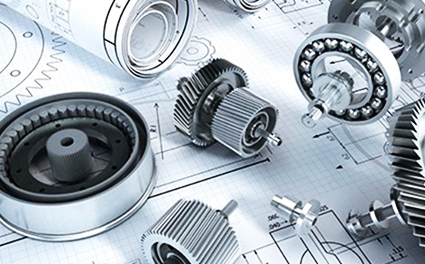Mechanical Engineering is a dynamic and diverse field that plays a pivotal role in shaping modern society. It encompasses the design, analysis, and development of mechanical systems and technologies used in various industries, ranging from manufacturing to transportation, energy, and robotics.
A department that excels in Mechanical Engineering boasts a range of qualities that set it apart. SIRT is staffed with highly qualified faculties, the majority holding PhDs and the rest pursuing them from renowned institutes. These experienced instructors foster a rich academic environment, where practical knowledge is highly valued and labs are well-equipped with working models to help students visualize concepts effectively.
In this department, the emphasis on student success is evident through the well-established tutor-guardian system, providing personal attention and support to each individual, especially those who require additional assistance. The research-oriented ambiance stimulates both faculties and students to participate in workshops, conferences, and research projects funded by national agencies.
Furthermore, the inclusion of value-addition courses prepares students for industry challenges and enhances their overall quality. The smart classrooms facilitate a better understanding of subjects, creating an engaging learning environment. The department's remarkable track record in producing consistently high-quality education and its use of innovative teaching strategies, such as the Experiential Learning theory, to improve student engagement and learning outcomes in courses like "Design of Machine Elements," make it a standout institution in the field of Mechanical Engineering.
Key Features
- Mechanical engineers are involved in the design and analysis of various mechanical systems and components, ranging from small parts to large-scale machines and structures.
- Mechanical engineers study thermodynamics and heat transfer principles to understand the behavior of energy in mechanical systems. This knowledge is crucial for designing efficient energy systems and heat exchange mechanisms.
- Mechanical engineers deal with the principles of mechanics and dynamics to analyze the motion and forces acting on objects. They use this knowledge to design machines, mechanisms, and structures that can withstand and control forces and motion.
- Understanding the properties of materials and their behavior under different conditions is essential for mechanical engineers. They choose appropriate materials for specific applications and develop manufacturing processes to create products efficiently.
- Mechanical engineers study the behavior of fluids (liquids and gases) and apply their knowledge to design systems such as pumps, turbines, and pipes. They analyze fluid flow, pressure, and forces to optimize the performance of these systems.
- Mechanical engineers work with control systems to regulate and automate various mechanical processes. They design and implement feedback mechanisms, sensors, and actuators to achieve precise control and improve system efficiency.
- Mechanical engineers play a significant role in the development and design of robotic systems and automation technologies. They integrate mechanical components, sensors, and control systems to create advanced automated systems for various industries.
- Mechanical engineers utilize computer-aided design software to create and simulate 3D models of mechanical components and systems. CAD tools enable engineers to visualize, analyze, and optimize their designs before manufacturing.
- Mechanical engineers often lead projects and teams, coordinating the design, development, and manufacturing processes. They manage resources, timelines, and budgets to ensure the successful completion of projects.
- With a growing focus on sustainability, mechanical engineers are involved in developing eco-friendly technologies and renewable energy systems. They design energy-efficient systems, explore alternative energy sources, and contribute to sustainable practices.
Why Study B.Tech in Mechanical Engineering?
Studying mechanical engineering (ME) offers a rewarding and diverse career path. It equips individuals with a strong foundation in designing and analyzing mechanical systems, enabling them to innovate and contribute to various industries. As a mechanical engineer, you gain expertise in understanding thermodynamics, mechanics, materials, and automation, which are fundamental to solving real-world challenges. The field's continuous advancements in sustainable technologies and renewable energy further add to its significance in shaping a greener future. Moreover, mechanical engineering opens doors to exciting opportunities in robotics, aerospace, automotive, and many other cutting-edge fields. Overall, studying mechanical engineering empowers individuals to make a tangible impact on society, driving progress and technological advancements that improve people's lives.
Scope and Job Profiles:
- Aerospace Engineer
- Nuclear Engineer
- CAD Technician
- Mechanical Engineer
- System Engineer
- Process Development Engineer
- Sales Engineer
- Design Engineer
- Quality Engineer
- Consulting Engineer
- Research & Development Engineer
Eligibility Criteria
- Candidates should have completed their 10+2 or equivalent examination from a recognized educational board or institution.
- The candidate should attain a minimum of 45% marks.
- Candidates should have cleared the Joint Entrance Examination (JEE).
Admission Process
1. Eligibility Criteria: The first step is to check if you meet the eligibility criteria for admission as quoted above.
2. Application Process: After the announcement of the admission process, you will need to apply for the institute. The application form may be available online or offline, where you will have to provide personal details, academic records, and other necessary information.
3. Counseling or Interview: SIRT conducts counseling sessions or interviews to assess the candidates' suitability for the program. These interviews may include questions about your academic background, interests, and goals.
4. Merit List: After the counseling or interview process, SIRT prepares a merit list based on the candidates' performance and records.
5. Seat Allotment: Once the merit list is ready, candidates will be allotted seats in the B.Tech Mechanical Engineering program based on their rank, preferences, and availability of seats.
6. Document Verification and Admission: Shortlisted candidates will need to submit their original documents for verification. After the verification process, you will be required to pay the admission fees and complete the formalities to secure your admission.
7. Waiting List: In case some seats remain vacant after the initial round of admissions, a waiting list may be released. If you are on the waiting list, you may be considered for admission if any seats become available.




